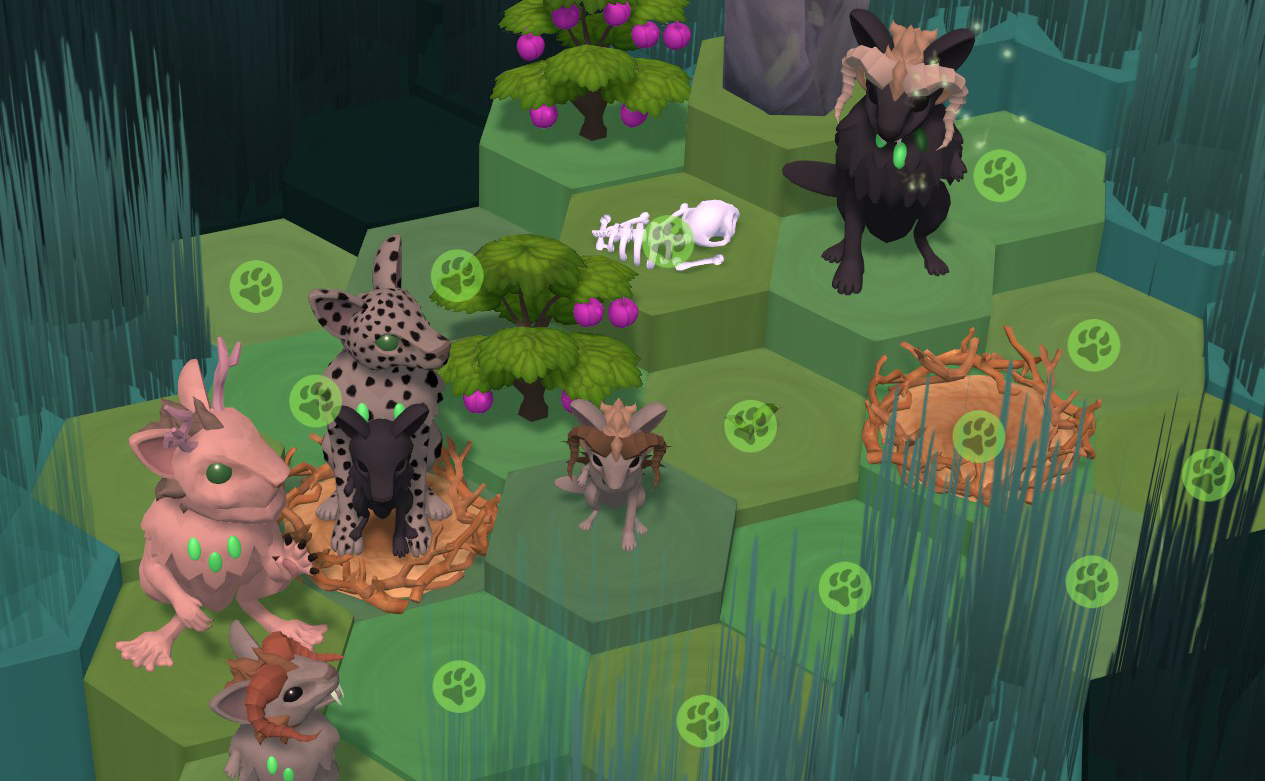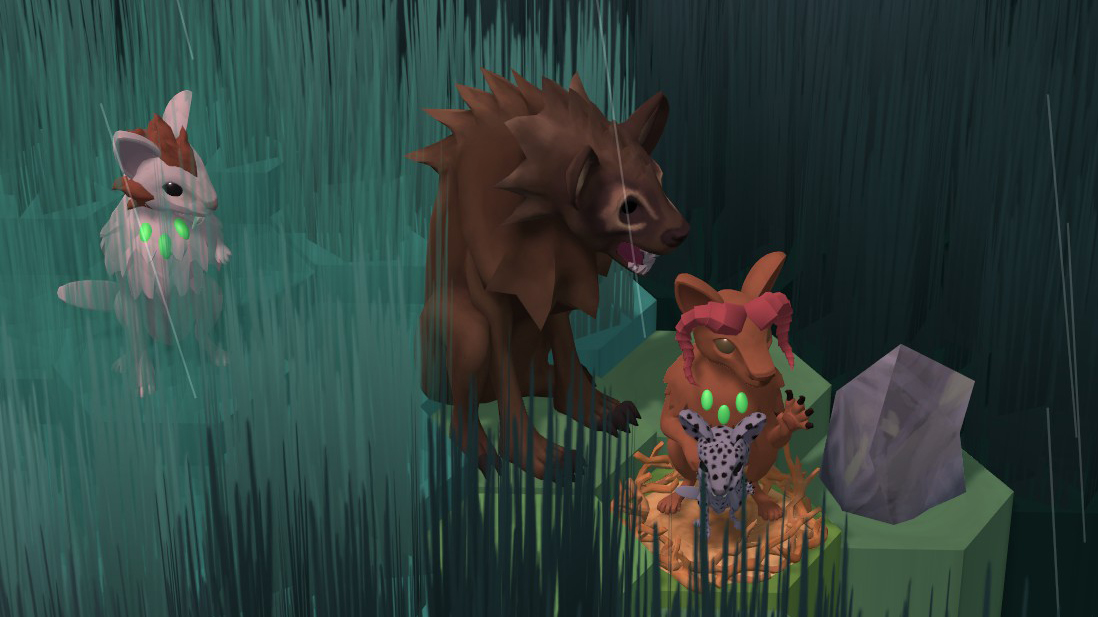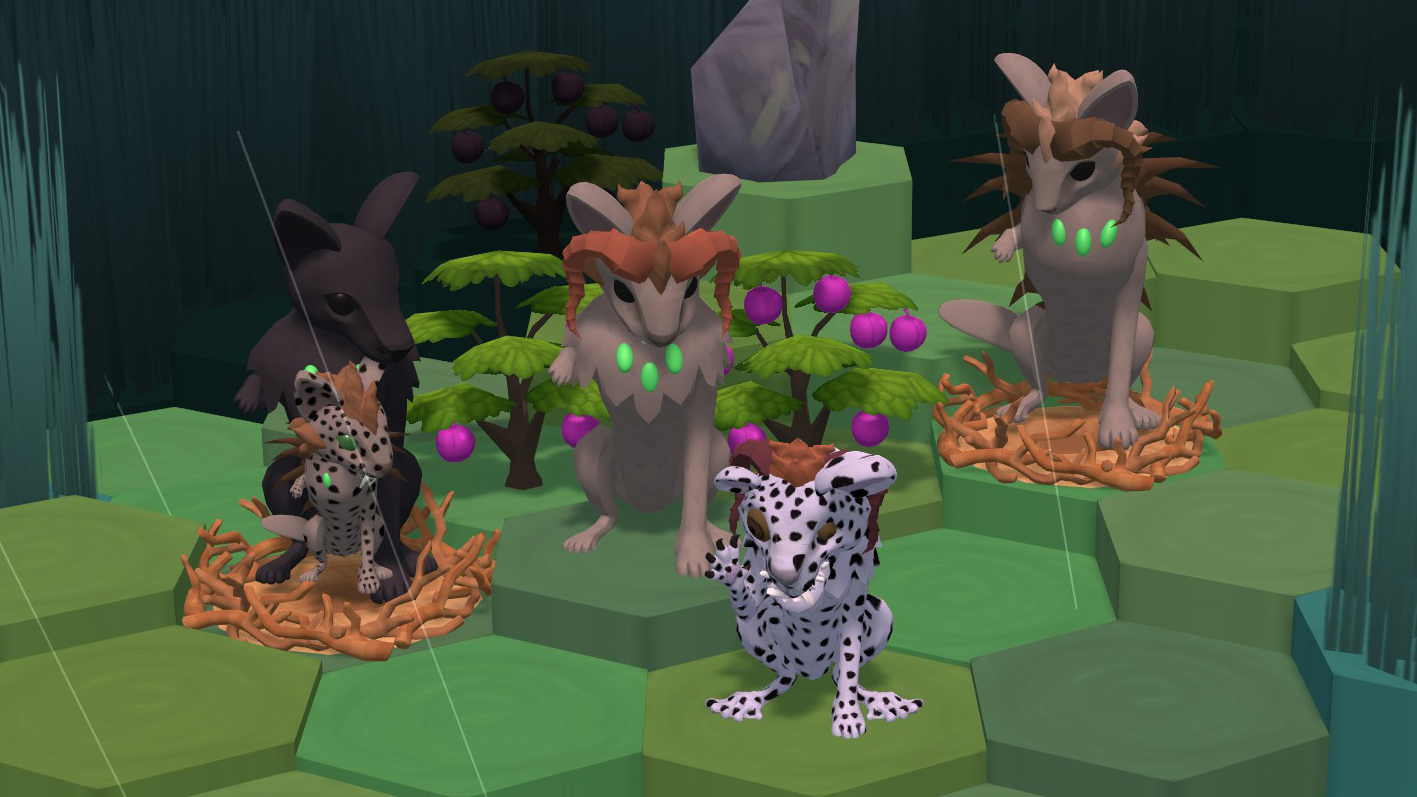Niche blends turn-based strategy, roguelike survival, and genetic mutations
Mate creatures, raise babies, tamper with genes, and watch out for predators.

For want of a rabbit, the family was lost. While trying to distance one of my animals from the skeleton of his fallen father—which I found a bit morbid—I sent him chasing a rabbit across the map. This left my two infants with only their mother to protect them, and just as their mother died of old age (another distasteful skeleton to eyeball) the bushes rustled and a looming carnivore appeared. Before I could move my distant, bunny-hunting creature back to the nest, the babies were both dead and soon their brother joined them thanks to wounds and starvation (he never did catch that rabbit).
Niche, now in Early Access, mixes a lot of ideas. It's a turn-based strategy game in which your animals have a certain amount of actions they can take each round—fighting enemies, moving across the map, or examining nearby hexes to remove the cloud of war (in this case, the cloud of tall grass). It's a survival game: you need to keep your animals fed by hunting and gathering. It's a roguelike: when your animals are dead, you start over from scratch with new and randomized pets. And, it's a genetics game: your creatures have attributes like speed, strength, gathering abilities, sight and hearing, and defenses like venom and spikes, and you try to breed them and mutate genes to produce even better, more durable creatures.
Finally, it's a sadness simulator, because your beloved creatures die. They all die. All of them. Occasionally abruptly, often violently, and even when it's from old age, always too soon.

My experiences with Niche have ranged from complete disaster to slightly-delayed complete disaster. Sometimes, it's up to luck. Beginning with two animals, Adam and Eve, you can quickly mate them and dispatch Eve to a nest, and within a round or two you'll have your first baby, which will begin to grow. As the rounds pass, other creatures may mosey by: sometimes they're friendly, or at least neutral, and you can invite them to join your clan for future mating, adding new genes into your pool. Sometimes, predators will show up and attempt to eat your flock, resulting in either fleeing (though the map isn't all that big) or fighting (a simple click to attack, with the results based on how capable your animals are in combat). Sometimes, there just aren't enough viable new partners to breed with and you wind up with the disagreeable and detrimental task of mating family members just so the tribe doesn't die out. But, that's nature. Horrible, disgusting, nature.
Most of my disasters have been self-inflicted, even when I've had plenty of good luck. Instead of gathering individual berries, you can also slash a bush to death, which gives you all the berries at once but means the bush will take a long time to grow back. I do this because I'm impatient, but it means I eventually have to send one of my animal family across the map to hunt for alternate food sources. There's safety in numbers, and keeping your family in close proximity is a good idea because at any time something can emerge from a nearby hex and start chewing on your helpless children. As has happened to me repeatedly.
I also tend to make my mating decisions based on looks rather than practical decisions (I'm shallow like that). When some crazy-eyed hyena-lookin' thing with black spots and goat horns popped out of the bushes, I didn't really care what kind of genes he had holstered, I just wanted to mate him with my completely black fox-lookin' animal to see what their kid would look like (the answer: grey, but with a tuft of brown hair, and pink goat horns, so yes, I think I made the right choice).

If you do want to deep dive into genetics, there are plenty of interesting options, everything from how fast your creatures' blood clots to how big their ears are. There's a gene mutation menu in which you can select the attributes you hope to mutate. Want your baby to develop poison fangs, warning dots on their fur so they appear venomous to predators, or gills for breathing under water? You can select them to have a better chance of these traits developing in your newborn. Niche is in Early Access, so not all genes have uses yet, but there are plans for things like camouflage and heat and cold resistance to play a role in certain biomes.
The biggest gaming news, reviews and hardware deals
Keep up to date with the most important stories and the best deals, as picked by the PC Gamer team.
I enjoy the breeding system and the attempts at creating super-mammals (or at least super-interesting-looking animals), though in Niche, impatience is my biggest problem. Many rounds consist of simply sitting there swatting at bushes to collect berries, and any time there's another option—chasing a rabbit, harvesting an oyster on the beach, or shaking a tree to collect the falling acorns—I tend to get careless, spread my tribe out too much, and wind up the feast for predators.
And yes, it's hard not to get attached to your family of pets and feel terrible when they croak, either because you got careless or simply because their life span—which is sometimes mere days of game time—came to an end. But that's life! One day you're enjoying fresh berries and waiting for your antlers to grow, and the next you're passing through a hyena's digestive tract and all that's left is a skeleton to prove you ever existed.

Chris started playing PC games in the 1980s, started writing about them in the early 2000s, and (finally) started getting paid to write about them in the late 2000s. Following a few years as a regular freelancer, PC Gamer hired him in 2014, probably so he'd stop emailing them asking for more work. Chris has a love-hate relationship with survival games and an unhealthy fascination with the inner lives of NPCs. He's also a fan of offbeat simulation games, mods, and ignoring storylines in RPGs so he can make up his own.

